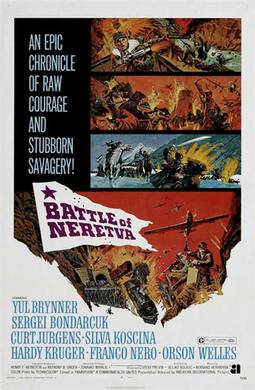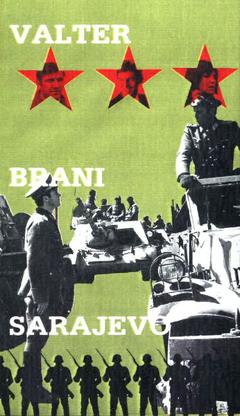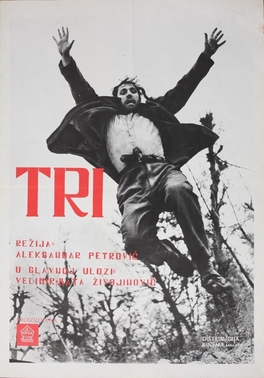
When Father Was Away on Business is a 1985 Yugoslav film by Serbian director Emir Kusturica. The screenplay was written by the Bosnian dramatist Abdulah Sidran. Its subtitle is A Historical Love Film and it was produced by Centar Film and Forum, production companies based in Sarajevo.

Rade Šerbedžija is a Croatian actor, director and musician. He is known for his portrayals of imposing figures on both sides of the law. He was one of the best known Yugoslav actors in the 1970s and 1980s. He is internationally known mainly for his role as Boris the Blade in Snatch (2000), his supporting roles in such Hollywood films as The Saint (1997), Mission: Impossible 2 (2000), X-Men: First Class (2011), Harry Potter and the Deathly Hallows: Part 1 (2010), and Taken 2 (2012); and for his recurring role as former Soviet Army General Dmitri Gredenko in Season 6 of TV action series 24.

Battle of Neretva is a 1969 Yugoslavian epic partisan film. Written by Stevan Bulajić and Veljko Bulajić, and directed by Veljko Bulajić, it is based on the true events of World War II. The Battle of the Neretva was due to a strategic plan for a combined Axis powers attack in 1943 against the Yugoslav Partisans. The plan was also known as the Fourth Enemy Offensive and occurred in the area of the Neretva river in Bosnia and Herzegovina.

Radivoj Korać was a Serbian and Yugoslav professional basketball player. He represented the Yugoslavia national basketball team internationally. Korać is well-known for holding the EuroLeague's all-time single-game scoring record, at 99 points scored, in a game versus Alviks, during the 1964–65 season, and for once making 100 out of 100 free throws on a live television show in Belgium.

Partisan film is the name for a subgenre of war films made in FPR/SFR Yugoslavia during the 1960s, 1970s and 1980s. In the broadest sense, main characteristics of Partisan films are that they are set in Yugoslavia during World War II and have Yugoslav Partisans as main protagonists, while the antagonists are Axis forces and their collaborators. According to Croatian film historian Ivo Škrabalo, Partisan film is "one of the most authentic genres that emerged from the Yugoslav cinema".

Veljko Bulajić was a Montenegrin film director and UNESCO Kalinga Prize recipient. Bulajić spent the majority of his life working in Croatia and is primarily known for directing World War II-themed movies from the Partisan film genre. According to the Croatian Public Broadcasting Company, his films have reached an audience of over 500 million viewers worldwide. The top four most viewed Yugoslav films of all time were all directed by Bulajić. MUBI streaming service describes Bulajić as "a creator of made-to-order epic blockbusters".

The Cinema of Yugoslavia refers to the film industry and cinematic output of the former Socialist Federal Republic of Yugoslavia, which existed from 1945 until it disintegrated into several independent nations in the early 1990s. Yugoslavia was a multi-ethnic, socialist state, and its cinema reflected the diversity of its population, as well as the political and cultural shifts that occurred during its existence.

I Even Met Happy Gypsies is a 1967 Yugoslav film by Serbian director Aleksandar Petrović. The film is centered on Romani people's life in a village in northern Vojvodina, but it also deals with subtler themes such as love, ethnic and social relationships. Beside Bekim Fehmiu, Olivera Vučo, Bata Živojinović and Mija Aleksić, film features a cast of Romani actors speaking the Romani language. I Even Met Happy Gypsies is considered one of the best films of the Black Wave in Yugoslav cinema.

Pula Film Festival is an annual Croatian film festival, established in 1954. It is held in a Roman amphitheater known as the Pula Arena. Pula Film Festival is the oldest Croatian film festival and is usually held in the summer, in July or August.

Three is a 1965 Yugoslav film directed by Aleksandar Petrović. It was nominated for the Academy Award for Best Foreign Language Film at the 39th Academy Awards. The script, written by Petrović, is based on the motifs of the short story collection Fern and Fire by Antonije Isaković. The film belongs to the Yugoslav Black Wave movement.

The Film and TV School of the Academy of Performing Arts in Prague or FAMU is a film school in Prague, Czech Republic, founded in 1946 as one of three branches of the Academy of Performing Arts in Prague. It is the fifth oldest film school in the world. The teaching language on most courses at FAMU is Czech, but FAMU also runs certain courses in English. The school has repeatedly been included on lists of the best film schools in the world by The Hollywood Reporter.
Train Without a Timetable is a 1959 Yugoslav film directed by Veljko Bulajić. It was entered into the 1959 Cannes Film Festival. The film was also selected as the Yugoslav entry for the Best Foreign Language Film at the 32nd Academy Awards, but was not accepted as a nominee.

Battle of Sutjeska is a 1973 Yugoslav partisan film directed by Stipe Delić. It tells the story of the famous Battle of Sutjeska, the greatest engagement of the Yugoslav Partisan War. The film is one of the most expensive ever made in Yugoslavia. It was selected as the Yugoslav entry for the Best Foreign Language Film at the 46th Academy Awards, but was not accepted as a nominee. It was also entered into the 8th Moscow International Film Festival where it won a Special Prize.
Kozara is a 1962 Yugoslav film directed by Veljko Bulajić. It is a well known film of the partisan film subgenre popular in Yugoslavia in the 1960s and 1970s and depicts events surrounding the Battle of Kozara.
Yugoslav Black Wave is a blanket term for a Yugoslav film movement of the 1960s and early 1970s. Notable directors include Dušan Makavejev, Žika Pavlović, Aleksandar Petrović, Želimir Žilnik, Mika Antić, Lordan Zafranović, Mića Popović, Đorđe Kadijević and Marko Babac. Their films are known for their non-traditional approach to film making, their dark humor and their critical examination of socialist Yugoslav society.
This page is based on this
Wikipedia article Text is available under the
CC BY-SA 4.0 license; additional terms may apply.
Images, videos and audio are available under their respective licenses.












